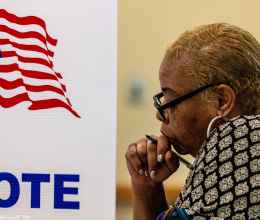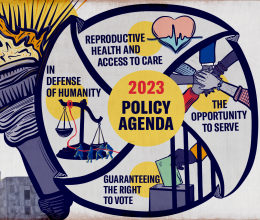
Next year, voters across the country will head to polls to cast their ballots for congressional and state representatives. The choices we’ll have before us as voters are dictated by what district we live in — lines that are redrawn every 10 years. This critical process, called redistricting, is intended to ensure each district accurately reflects the people who live there. But in practice, some states have strayed from that ideal and instead drawn district lines that dilute the power of voters of color, particularly Black voters, in an effort to manipulate election results.
This manipulation undermines our democracy. Voters should pick their politicians; not the other way around. Ensuring district maps are drawn equitably is key to fair and effective representation for all voters, reconciling decades of power imbalances, and systemic equality. Here are three notable cases in which the ACLU is advocating for fair maps.
Louisiana: Robinson v. Ardoin
This month, we celebrated a win in our challenge to the congressional map enacted by Louisiana Legislators following the 2020 census. Louisiana’s congressional map violates Section 2 of the Voting Rights Act by failing to provide Black voters an equal opportunity to elect their candidates of choice in a second district, thereby diluting their voting power. The Fifth Circuit Court of Appeals agreed that the map was discriminatory, and likely violated the VRA.
Black voters from the two largest and majority-Black cities in Louisiana have long been packed into a single congressional district, weakening their political influence and ability to advocate for their concerns within the halls of congress. The Legislature is required by the court to draw a new map by May 2024. We’ll be keeping a close eye on this process to ensure the next map accurately reflects Louisiana voters in time for the upcoming election season.
South Carolina: Alexander v. South Carolina State Conference of the NAACP
In 2022, South Carolina adopted a racially-gerrymandered map that moved hundreds of thousands of voters to different congressional districts, carefully calibrating the districts’ Black populations in all but one district to a low enough level to deny Black voters the equal opportunity to elect candidates of their choice. Alongside our partners, we challenged the map’s constitutionality in court on behalf of the South Carolina NAACP and affected voters. After a two-week trial, a panel of three federal judges unanimously concluded that South Carolina’s congressional map is unconstitutional, and the state appealed to the Supreme Court.
The court heard oral arguments in October, and we await their decision.
Alabama: Allen v. Milligan
In October, a district court in Alabama once again ordered the state to adopt a congressional map with two districts where Black voters have the opportunity to elect the candidates of their choice. This win followed two years of litigation by the ACLU and our partners on behalf of four individual voters, Greater Birmingham Ministries, and the NAACP of Alabama. We challenged Alabama’s congressional district boundaries as racially discriminatory under Section 2 of the Voting Rights Act and the Fourteenth Amendment. In Alabama, voting is racially polarized, and white and Black voters largely support different candidates. Despite having seven congressional districts and a Black voting-age population of over 27 percent, Alabama only allowed Black voters an opportunity to elect a representative in one district, or 14 percent of the state’s delegation.
The district court’s ruling followed a historic win for voting rights at the Supreme Court in 2022, reaffirming the need for Section 2 to protect Black political power, when the court ruled in our favor.





